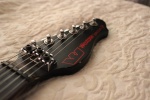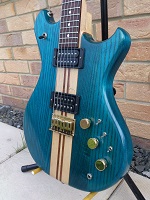triaging/repairing electronics problems
+5
colt933
Barry
jimmydime
The Chad
Brainfertilizer
9 posters
Page 1 of 1
 triaging/repairing electronics problems
triaging/repairing electronics problems
Okay, I have an Ohm Meter.
Here are the problems some of my guitars have:
1) guitar cuts out if input jack is moved at all
2) guitar cuts out if volume (or tone) knob gets moved at all
3) No sound when blade switch is in position 5 (neck only humbucker), but seems to have normal sound in notch position 4 (middle single coil + neck auto-cut to single coil) because there is a different than sound in position 3 (middle single coil only)
4) 1% of sound in any position (can only hear sound coming through amp if I turn it up to 9 or higher on 75W amp)
5) no sound at all in any position
So do I just start re-soldering joints? Is there an easy way to figure out which joint it might be? is there an easy way to figure out if a pot has gone bad (if that is even possible)? is there an easy way to figure out if a pickup has gone bad (if that is even possible)? is there an easy way to figure out if a section of wire is bad (if that is even possible)?
I think that an input jack problem can sometimes be dirty contact points. Could it also be the arm portion of the jack is too loose, and so bending it back in a little might help?
I need a triage system, step by step, to help me figure out where the problems are so I don't waste time fixing things that aren't broken.
Is there a guitar repair book anyone can recommend?
Here are the problems some of my guitars have:
1) guitar cuts out if input jack is moved at all
2) guitar cuts out if volume (or tone) knob gets moved at all
3) No sound when blade switch is in position 5 (neck only humbucker), but seems to have normal sound in notch position 4 (middle single coil + neck auto-cut to single coil) because there is a different than sound in position 3 (middle single coil only)
4) 1% of sound in any position (can only hear sound coming through amp if I turn it up to 9 or higher on 75W amp)
5) no sound at all in any position
So do I just start re-soldering joints? Is there an easy way to figure out which joint it might be? is there an easy way to figure out if a pot has gone bad (if that is even possible)? is there an easy way to figure out if a pickup has gone bad (if that is even possible)? is there an easy way to figure out if a section of wire is bad (if that is even possible)?
I think that an input jack problem can sometimes be dirty contact points. Could it also be the arm portion of the jack is too loose, and so bending it back in a little might help?
I need a triage system, step by step, to help me figure out where the problems are so I don't waste time fixing things that aren't broken.
Is there a guitar repair book anyone can recommend?

Brainfertilizer- Senior Member
- Number of posts : 525
Registration date : 2011-05-04
 Re: triaging/repairing electronics problems
Re: triaging/repairing electronics problems
I had similar problems on a few guitars.
I used 2000 grit sandpaper, rolled it up to fit snug into my jack and rubbed it around in there and blew it out. That fixed my jack issue. Another guitar I had to bend the jack arm up, as well as sand down the entire jack, all contact points of the jack. It fixed it.
Two guitars had no output in the neck position of the 5 way switch, I disassembled the fiveway switch and sanded the contact points. Fixed it.
As for pots, they're super simple mechanisms. Deoxit them first. Usually works. If not, replace it.
As far as soldering goes, the joints are usually fine unless someone messed around and didn't know what they were doing. If the joints aren't shiny and pretty, than this may be an issue. But not always! Do the other things first. It's amazing how the switches and jack will immobilize a guitar!
I used 2000 grit sandpaper, rolled it up to fit snug into my jack and rubbed it around in there and blew it out. That fixed my jack issue. Another guitar I had to bend the jack arm up, as well as sand down the entire jack, all contact points of the jack. It fixed it.
Two guitars had no output in the neck position of the 5 way switch, I disassembled the fiveway switch and sanded the contact points. Fixed it.
As for pots, they're super simple mechanisms. Deoxit them first. Usually works. If not, replace it.
As far as soldering goes, the joints are usually fine unless someone messed around and didn't know what they were doing. If the joints aren't shiny and pretty, than this may be an issue. But not always! Do the other things first. It's amazing how the switches and jack will immobilize a guitar!

The Chad- Financial supporter
- Number of posts : 2772
Location : Harrisburg, Pennsylvania
Registration date : 2011-02-01
 Re: triaging/repairing electronics problems
Re: triaging/repairing electronics problems
Awesome! I always prefer the least invasive methods!

Brainfertilizer- Senior Member
- Number of posts : 525
Registration date : 2011-05-04
 Re: triaging/repairing electronics problems
Re: triaging/repairing electronics problems
Lol, me too.

The Chad- Financial supporter
- Number of posts : 2772
Location : Harrisburg, Pennsylvania
Registration date : 2011-02-01
 Re: triaging/repairing electronics problems
Re: triaging/repairing electronics problems
I was wondering what model guitar you have, but I will chime in anyway.
Great advice by The Chad. On one of my Strats I had a problem with two of the pots. The volume started acting up first then the tone. Turn them, touch them..... no sound. I was sometimes able to tap on the volume and get it to work occasionally.
Replaced both with high quality pots and the problem was gone.
The other thing I was thinking about was a ground issue. Perhaps trace your grounding routes and make sure there is no loose contacts.
Great advice by The Chad. On one of my Strats I had a problem with two of the pots. The volume started acting up first then the tone. Turn them, touch them..... no sound. I was sometimes able to tap on the volume and get it to work occasionally.
Replaced both with high quality pots and the problem was gone.
The other thing I was thinking about was a ground issue. Perhaps trace your grounding routes and make sure there is no loose contacts.

jimmydime- Westone Nut
- Number of posts : 49
Location : Ontario
Registration date : 2013-10-25
 Re: triaging/repairing electronics problems
Re: triaging/repairing electronics problems
Brain, 90% of this sort of problem is down to oxidation, usually in the wipers of the pots. You typically can get a 'hit and miss' output as you turn the knob.
In the case of the switch it's usually the same sort of deal. But because the contact area on the points is very tiny it doesn't take much to interfere with the signal, and it's not uncommon to lose it altogether in one or more positions.
"Sanding" will certainly remove the crud and is a quick fix. But I would caution you to proceed very carefully. The grit is very abrasive and can quickly change the contours of the contact area. You might make things worse! If you must "sand" use a fine grit emery cloth which is also less likely to create debris.
By aware that sanding will also expose bare metal which of course will re-oxidize. Best to stick with contact cleaner whenever possible.
In the case of the switch it's usually the same sort of deal. But because the contact area on the points is very tiny it doesn't take much to interfere with the signal, and it's not uncommon to lose it altogether in one or more positions.
"Sanding" will certainly remove the crud and is a quick fix. But I would caution you to proceed very carefully. The grit is very abrasive and can quickly change the contours of the contact area. You might make things worse! If you must "sand" use a fine grit emery cloth which is also less likely to create debris.
By aware that sanding will also expose bare metal which of course will re-oxidize. Best to stick with contact cleaner whenever possible.
_________________
"A little song. A little dance. A little seltzer down your pants." -Chuckles the Clown

GUITARS : https://legend.barryeames.com
MUSIC/PIX/VIDEOS: https://getback.barryeames.com (including Spectrum ST)
 Re: triaging/repairing electronics problems
Re: triaging/repairing electronics problems
I worked for pro-audio contractor Phase Audio in Memphis, TN back in the mid to late '80s. Back in the days when radio stations played vinyl, the Phase Audio turntable preamp was THE industry standard - their preamps were in 80% of the radio stations in the US. By the time I got there, most radio stations were playing CDs. So the focus of the firm was more on studio design and construction (which they had done in the heyday of vinyl too) and I worked on the build and wiring of lots of studios around that time.
The engineer/designer/owner was Murphy Odom - a pure genius. The guy could make anything sound phenomenal. And his hearing was crap because he was old, white, and a guitar player - the 3 worst demographics for hearing damage. But still - he knew the limits of his ears and could still make anything sound phenomenal.
He had a cure for oxidized pots. Sure he used contact cleaner or deoxit or whatever first, but then using a little syringe, he would squirt a little Marvel Mystery Oil in through the little slot in the back of the pot and then turn the pot maybe 10-20 times to distribute the oil. And this cured it for all time. That pot would never act up again and would never oxidize again. Period.
I have lots of other interesting (to me) stories about this guy and the things he pulled off.
The engineer/designer/owner was Murphy Odom - a pure genius. The guy could make anything sound phenomenal. And his hearing was crap because he was old, white, and a guitar player - the 3 worst demographics for hearing damage. But still - he knew the limits of his ears and could still make anything sound phenomenal.
He had a cure for oxidized pots. Sure he used contact cleaner or deoxit or whatever first, but then using a little syringe, he would squirt a little Marvel Mystery Oil in through the little slot in the back of the pot and then turn the pot maybe 10-20 times to distribute the oil. And this cured it for all time. That pot would never act up again and would never oxidize again. Period.
I have lots of other interesting (to me) stories about this guy and the things he pulled off.

colt933- Senior Member
- Number of posts : 583
Registration date : 2008-04-08
 Re: triaging/repairing electronics problems
Re: triaging/repairing electronics problems
Great story.
I was not aware of MMO but I've just been reading a bit about it. Very interesting stuff apparently. If WikiPedia can be trusted it contains about 25% solvent (naptha) which accounts for the cleaning effect.
The majority is good old mineral oil which would protect against re-oxidation. (Dunno about the "lard" )
)
I was not aware of MMO but I've just been reading a bit about it. Very interesting stuff apparently. If WikiPedia can be trusted it contains about 25% solvent (naptha) which accounts for the cleaning effect.
The majority is good old mineral oil which would protect against re-oxidation. (Dunno about the "lard"
 )
)_________________
"A little song. A little dance. A little seltzer down your pants." -Chuckles the Clown

GUITARS : https://legend.barryeames.com
MUSIC/PIX/VIDEOS: https://getback.barryeames.com (including Spectrum ST)
 Re: triaging/repairing electronics problems
Re: triaging/repairing electronics problems
i think the most important factor in troubleshooting is to have a systematic approach to your problem.
there are 2 basic ways to go about it.
1. you can go end to end and check the circuit and components one at a time. (good for simple circuits)
2. you can divide the circuit in half, to try to figure out which half contains the problem. continue dividing each half until the the fault is identified. (good for more complex circuits)
troubleshooting techniques chosen usually depend on what type of problem needs repair
be open to unexpected findings, sometimes the problem is not caused by what you may have assumed to be defective or incorrect.
make lots of notes on what you find and what you change
basic knowledge of series/parallel circuits and familiarity with the normal setup and function of a guitar is all you need. the rest is really case by case for the right approach to each repair job
there are 2 basic ways to go about it.
1. you can go end to end and check the circuit and components one at a time. (good for simple circuits)
2. you can divide the circuit in half, to try to figure out which half contains the problem. continue dividing each half until the the fault is identified. (good for more complex circuits)
troubleshooting techniques chosen usually depend on what type of problem needs repair
be open to unexpected findings, sometimes the problem is not caused by what you may have assumed to be defective or incorrect.
make lots of notes on what you find and what you change
basic knowledge of series/parallel circuits and familiarity with the normal setup and function of a guitar is all you need. the rest is really case by case for the right approach to each repair job

gittarasaurus- Financial supporter
- Number of posts : 1519
Location : San Francisco, CA
Registration date : 2011-05-25
 Re: triaging/repairing electronics problems
Re: triaging/repairing electronics problems
Marvel's Mystery Oil is used like crazy around my area. Interesting to hear about using it in pots. Hmmm....

The Chad- Financial supporter
- Number of posts : 2772
Location : Harrisburg, Pennsylvania
Registration date : 2011-02-01
 Re: triaging/repairing electronics problems
Re: triaging/repairing electronics problems
WD-40 works great as well......I use it whenever I don't have my trusty can of Chemtronics contact cleaner. I think the can I have is about 20 years old and still going strong. like any cleaner, a little goes a loooong way.

contrahell- Westone Nut
- Number of posts : 46
Registration date : 2013-03-12
 Re: triaging/repairing electronics problems
Re: triaging/repairing electronics problems
Lots of sources say that WD40 is a no-no for pots. I only use Servisol Super 10 contact cleaner.
If it works then do it!!
Hoax
If it works then do it!!
Hoax

hoax- Financial supporter
- Number of posts : 1104
Age : 65
Location : Bothwell
Registration date : 2009-09-01
 Re: triaging/repairing electronics problems
Re: triaging/repairing electronics problems
That's odd, every time I have used WD40 it has ruined the pot......Servisol Super 10 all the way.

Sgt. Vimes- Financial supporter
- Number of posts : 3322
Age : 53
Location : tyneside
Registration date : 2011-11-03
 Re: triaging/repairing electronics problems
Re: triaging/repairing electronics problems
WD40's main claim to fame is it's ability to displace water, penetrate and lubricate seized metal parts. (WD in fact is short for "Water Displacement")
But it's absolutely not the best thing on electrical contact. "Lubrication" is the opposite of what you want. It acts as an insulator. Oxidation is the reason there's no contact in the first place, so you want the contacts to be free and clean of oxidation.
But it's absolutely not the best thing on electrical contact. "Lubrication" is the opposite of what you want. It acts as an insulator. Oxidation is the reason there's no contact in the first place, so you want the contacts to be free and clean of oxidation.
_________________
"A little song. A little dance. A little seltzer down your pants." -Chuckles the Clown

GUITARS : https://legend.barryeames.com
MUSIC/PIX/VIDEOS: https://getback.barryeames.com (including Spectrum ST)
 Re: triaging/repairing electronics problems
Re: triaging/repairing electronics problems
WD-40 turns sticky after a while.

colt933- Senior Member
- Number of posts : 583
Registration date : 2008-04-08
 Similar topics
Similar topics» Repairing lock nuts !
» Repairing a Bendmaster locking nut with Helicoils
» Repairing a Nut with Baking Soda and Super Glue
» Pickup Problems?
» '90 Spectrum DLX Tremelo problems
» Repairing a Bendmaster locking nut with Helicoils
» Repairing a Nut with Baking Soda and Super Glue
» Pickup Problems?
» '90 Spectrum DLX Tremelo problems
Page 1 of 1
Permissions in this forum:
You cannot reply to topics in this forum|
|
|

 Website
Website Facebook
Facebook